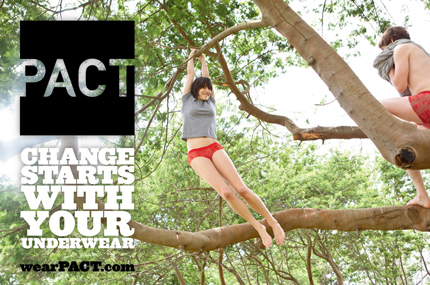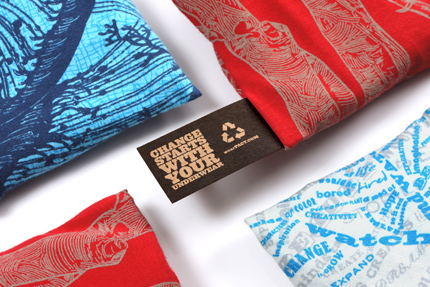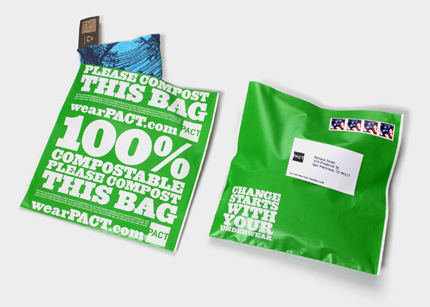
PACT underwear's branding emphasizes youth, eco-friendliness and style. Graphics by Fuseproject
The multibillion-dollar underwear market thrives on a combination of sexy styles and ads and boldfaced names emblazoned on waistbands. So when Jason Kibbey and Jeff Denby, co-founders of the San Francisco underwear company PACT decided to launch their new line based on principles of social entrepreneurship and sustainable design, they faced tough choices about how far to stray from conventional underwear marketing.
One priority was to create underwear that was not only sustainable but also stylish (thongs for women and snug trunks for men) in bold colors and patterns, all wrapped in eco-friendly packaging. After all, recalls chief executive Kibbey, “What we’d seen before in sustainable underwear was terrible and oatmeal colored, with awful fabrics and so much packaging that they had no green credibility. Innovation and design were missing.” Another concern was establishing a traceable supply chain that stretches from the Turkish farmers who grow the organic cotton for the garments to the Turkish factory that manufactures them with low-impact dyes and finally to the reusable (and ultimately compostible) shipping bags. Moreover, the entrepreneurs opted to donate 10 percent of their sales revenue to carefully selected nonprofits, whose field of activism would directly inspire the design. “We wanted to integrate cause and design, to make a deep connection between the two,” explains Kibbey.

PACT's patterns are influenced by the nonprofit groups to which the company donates
The idea for PACT was hatched while Kibbey and Denby were pursuing MBA degrees at the University of California, Berkeley, and presented their underwear project at a student design competition that was judged by the San Francisco designer Yves Béhar. After graduating, the two created a design venture with Béhar’s studio, Fuseproject, which has an equity stake in PACT and is responsible for branding and marketing as well as design. Béhar says he always wanted to do an underwear line because the market was ready for a fresh, sustainable approach. “You go to a store and search through boxes for the right size and shape while looking at perfect bodies, it’s ridiculous,” he explains. “It’s like an old fashioned retail environment.”
Béhar didn’t tinker much with basic underwear forms. PACT’s are “not sexually enhanced,” he jokes. And while one surfer dude appears on PACT’s website, the brand’s models don’t resemble moonlighters from Abercrombie & Fitch ads. But Béhar did reduce the PACT label size to a mere 5 millimeters, a reversal of the usual “wearing a billboard on the most intimate part of your body,” he says. More attention was given to color and pattern inspired by selected nonprofits. For Oceana, the pattern linked to a global ocean conservation organization, Behar chose blue hues and stylized undersea flora based on a Japanese woodcut. For 826 National, which is connected to a program to encourage young writers, words were strung together to resemble a grove of trees.

The packaging can be recycled and ultimately composted
The nonprofits in the initial marketing push were chosen to overlap with PACT’s target demographic of urban, well-educated, youthful consumers. The organizations, Kibbey explains, “had to resonate with our customers, and have a strong visual brand identity. We didn’t want anything dreary or depressing which wouldn’t fit with our design sensibility.” Oceana, for example, uses market-based advocacy methods while 826 National counts writer David Eggers as a founder (that design is the current bestseller).
Eventually, PACT hopes to link up with eight to ten nonprofits and possibly extend the line to socks, T-shirts and denim. With its underwear priced at between $22 and $26 a pair, PACT should provide a continuing stream of revenue to worthy endeavors.
